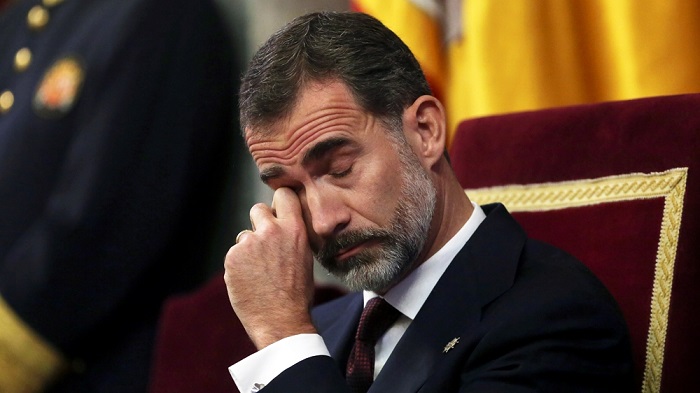
Spanish king shunned by left-wing MPs at parliament
Spanish King Felipe VI has been embarrassed at the opening ceremony of the country's newly elected parliament, as he became the target of a series of anti-monarchy protest actions launched by left-wing politicians.
Members of the Unidos Podemos (United We Can) movement took advantage of Felipe's parliament speech on Thursday to show their disregard for the monarchy, holding up a flag calling for a "Third Republic", which many left-wingers would like to see replace the current constitutional monarchy.
The bloc's 71 members - making up the legislature's third-largest party - made a point of not applauding the king during his speech and stayed seated during the playing of the national anthem. Several representatives of regional parties also joined the anthem protest.
Other MPs, including union leader Diego Canamero, wore black sweatshirts with the statement "I didn't vote for any king", making sure they could be seen by members of the royal family.
Earlier, several Podemos MPs refused to greet the king, Queen Letizia and their daughters Leonor, 11, and Sofia, 9 - as is customary.
Podemos members also skipped a military parade that closed the opening ceremony.
"Some people are heads of state because they are the son, grandson or great-grandson of a dynasty. With all due respect, we have more legitimacy because we were elected by the people," said Podemos leader Pablo Iglesias.
In his speech, marking the opening of a new session of parliament after nearly a year of political paralysis, Spain's king urged an end to the corruption scandals that have long plagued the country.
"Corruption ... must become but a sad memory of a scourge that we have to defeat," Felipe VI said on Thursday.
The matter is particularly close to the heart for the king, whose sister is on trial over the alleged illegal business dealings of her husband. The verdict is expected by the end of the year.
At the same time, ex-lawmakers and politicians from the ruling conservative Popular Party (PP) are on trial in one of Spain's biggest corruption scandals - the so-called Gurtel affair - involving alleged kickbacks, fake invoices and Swiss bank accounts.
The parliamentary opening comes just weeks after conservative Prime Minister Mariano Rajoy took power again after 10 months of political limbo.
The period was marked by two elections that produced no clear winner as upstart centrists Ciudadanos and far-left Podemos upset the traditional two-party system.
Rajoy's comeback was only made possible after the Socialist party decided to abstain in a crunch parliamentary confidence vote in October, instead of voting against him.
But unlike in 2011 when he came to power with an absolute majority, the PP only has 137 out of 350 MPs, meaning Rajoy will have to negotiate every bill with the opposition.
